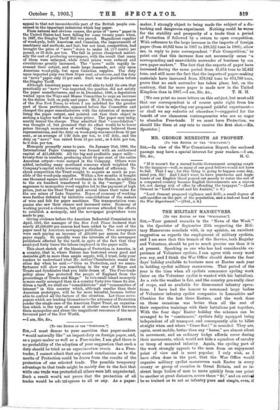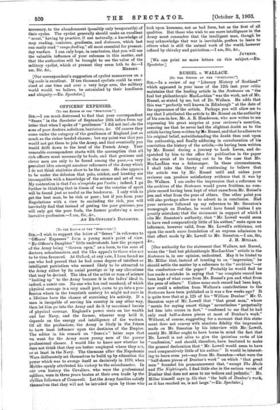THE MILITARY MANCEUVRES. [To THE EDITOR Or THE "SPECTATOR.1 Sm,—Your
general remarks in the "News of the Week" in the Spectator of September 26th respecting the Mili- tary Manceuvres conclude with, in my opinion, an excellent suggestion as regards the employment of military cyclists, and I am sure that this branch of the Service, both Regular and Volunteer, should be put to much greater use than it is at present. Speaking as one who has had considerable ex- perience of Volunteer cyclists, I can agree with every word you say, and I think the War Office should devote the four days' holiday available to business men at Easter each year in holding cyclist military manceuvres. That period of the year is the time when all cyclists commence cycling work (later on the Volunteer cyclist is wanted with his battalion). As a rule the weather is fair, and the country generally cleat of crops, and so available for dismounted infantry opera- tions. I have had the honour to command large bodies of Volunteer infantry cyclist companies in Lancashire and Cheshire for the last three Easters, and the work done on those occasions was better than all the rest of their respective trainings with their battalions put together. With the four days' Easter holiday the schemes can be arranged to be "continuous," cyclists fully equipped being independent of all transport, and consequently able to billet at night when and where "Cease fire!" is sounded. They are, again, most mobile, better than any "horse," are almost silent in movement, and an ordinary hedge affords cover during their movements, which would not hide a squadron of cavalry or troop of mounted infantry. Again, the cycling part of the work strongly appeals to the men from an enjoyment point of view and is most popular. I only wish, as I have often done in the past, that the War Office would organise military cyclist manceuvres each Easter in every county or group of counties in Great Britain, and so in- struct large bodies of men to move' quickly from one point to another at great distances, arrive there "fit," and on arrival be so trained as to act as infantry pure and simple, even, if necessary, to the abandonment (possibly only temporarily) of their cycles. The cyclist generally should make an excellent "scout," having by practice, if not naturally, a knowledge of map reading, contours, gradients, and distances, which last can easily read "range-finding," all most essential for present- clay warfare. I can only hope, in conclusion, that you will use the valuable influence of your columns in this matter, and that the authorities will be brought to see the value of the military cyclist, which at present they seem loth to do.—I [Our correspondent's suggestion of cyclist manceuvres on a big scale is excellent. If ten thousand cyclists could be exer- cised at one time and over a very large area, the military world would, we believe, be astonished by their handiness and ubiquity.—The Spectator.]



























































 Previous page
Previous page